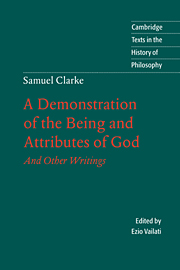Book contents
- Frontmatter
- Contents
- Acknowledgments
- List of abbreviations
- Introduction
- Chronology
- Further reading
- Note on the text
- A Demonstration of the Being and Attributes of God
- Other writings
- I Several Letters to the Reverend Dr. Clarke
- II The Answer to a Sixth Letter
- III The Answer to a Seventh Letter
- IV Letters to Dr. Clarke concerning Liberty and Necessity
- V From Remarks Upon a Book
- VI From Clarke's Sermons on Several Subjects
- VII From A Discourse concerning the Unchangeable Obligations of Natural Religion
- VIII From Four Defences of a Letter to Mr. Dodwell
- IX From A Collection of Papers which passed between the late learned Mr. Leibniz and Dr. Clarke
- Index
- Cambridge Texts in the History of Philosophy
VIII - From Four Defences of a Letter to Mr. Dodwell
Published online by Cambridge University Press: 07 January 2010
- Frontmatter
- Contents
- Acknowledgments
- List of abbreviations
- Introduction
- Chronology
- Further reading
- Note on the text
- A Demonstration of the Being and Attributes of God
- Other writings
- I Several Letters to the Reverend Dr. Clarke
- II The Answer to a Sixth Letter
- III The Answer to a Seventh Letter
- IV Letters to Dr. Clarke concerning Liberty and Necessity
- V From Remarks Upon a Book
- VI From Clarke's Sermons on Several Subjects
- VII From A Discourse concerning the Unchangeable Obligations of Natural Religion
- VIII From Four Defences of a Letter to Mr. Dodwell
- IX From A Collection of Papers which passed between the late learned Mr. Leibniz and Dr. Clarke
- Index
- Cambridge Texts in the History of Philosophy
Summary
[Editor's Note: The exchange between Clarke and Anthony Collins on whether matter can think originated with Clarke's letter to Henry Dodwell (1641–1711), who had adopted the mortalist thesis that at death only divine intervention can prevent the death of the soul. The first excerpt shows Clarke trying to reconcile his belief in the local extension of the soul with that of its immateriality; it also contains the best statement of Clarke's proof that matter cannot possibly be conscious. The second presents Clarke's views on the nature of gravitation and should be read in conjunction with supplementary text vii. The third reiterates Clarke's view on the successiveness of divine thinking and briefly addresses whether matter acts on the soul.]
From A Second Defence of the Immateriality and Natural Immortality of the Soul [Wiii, 794–9]
… To the difficulties arising from the supposition of immateriality not excluding extension, I answer:
1. That all these difficulties are wide of the main question. For if the foregoing proof, that matter is incapable of thinking, cannot be shown to be defective, it follows necessarily that the soul must be an immaterial indiscerpible substance.
- Type
- Chapter
- Information
- Samuel Clarke: A Demonstration of the Being and Attributes of GodAnd Other Writings, pp. 151 - 160Publisher: Cambridge University PressPrint publication year: 1998

